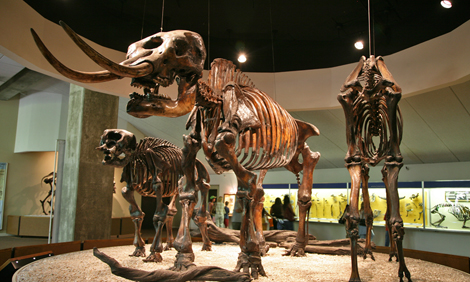


Scientists and volunteers hope to find enough mastodon bones to make a complete skeleton like this one.
A sunny Florida beach town may be the last place people would expect to find the remains of an Ice Age creature. Yet that’s just what workers discovered recently in Daytona Beach, Florida. While digging at a construction site there, workers found some unusual bones in the mud. Scientists determined that the bones were from a mastodon, a hairy, elephant-like animal that lived in North America thousands of years ago.
During the last Ice Age, Florida’s climate was not as hot and humid as it is today. It was cooler and drier. Large animals, such as mastodons, saber-toothed cats, and giant sloths roamed the land. Scientists think that the Daytona mastodon lived in Florida at least 13,000 years ago.
Scientists say that the layers of muck in Florida’s ground helped preserve the mastodon’s bones all these years. The muck blocked oxygen that would normally cause bones to rot and decay. For this reason, many prehistoric fossils have been found in Florida. In fact, so many fossils have been found in Central Florida that some people call the region “Bone Valley.”
After the mastodon remains were discovered, volunteers joined the scientists at the dig site to find more pieces of the mastodon. Schoolchildren helped with the search, too. Scientists and volunteers found two tusks, two large vertebrae, teeth, a jawbone, pieces of a skull, rib fragments, and part of a leg bone. They hope to find enough bones to add up to a complete skeleton. The mastodon bones will eventually be put on display at the Museum of Arts and Sciences in Daytona Beach.
Image credit: ©Julie Dermansky/Photo Researchers, Inc.
Related Links
- Daytona Beach Museum of Arts and Sciences
Learn about the Florida museum that will host the mastodon bones. - Ultimate Guide to the Awesome: Mastodons and Mammoths
Watch a video to learn about the differences between mastodons and mammoths.


























